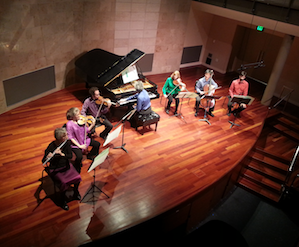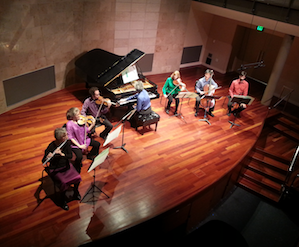
Photo by Be'eri Moalem
At the Leipzig Gewandhaus the phrase “Res Severa Verum Gaudium” is etched above the stage — “True Pleasure is Serious Business.” The Left Coast Chamber Ensemble brought that message home Monday night, presenting a concert of “Some Serious Fun” at the San Francisco Conservatory of Music’s Sol Joseph Recital Hall.
The most fun piece in the concert was Moritz Eggert’s Pong (2003). It begins with musical and visual representation of one of the first video games ever. The performers were arranged in a V-formation: At the vertex was the piano, keyboard facing the audience; at each end was a woodwind-- clarinet, and flute; string players formed the connecting diagonals.
A pop from the flute triggered glissandi passed along the strings, a clicking swipe across the piano keys using a guitar pick, through more glissandi, and over to the clarinetist, who responded with another pop, which bounces the sliding wave back towards the flute. The players leaned over to each other as their sliding gestures overlapped. The musical tennis match soon developed layers of counter rhythms and difficult episodes as the game speeds up but Eggert always maintains that mesmerizing back-and-forth motion. The theatrical element started off as funny but quickly built up for an impressive adventure —this piece would not be nearly as effective on a recording. Pianist Eric Zivian embodied the far-flung intensity of the piece, flailing at the huge pages of the score, reaching into the belly of the piano to strum the strings, and slamming the keyboard lid shut to end the piece.
Steve Horowitz’s The Wonder Pets Save the Circus certainly fit the bill as fun comic relief, and that’s about it. Painfully awkward, high and fast violin writing (performed admirably by violinist Anna Pressler) and simple accompaniment for piano and supporting ensemble probably sounded better on MIDI as part of a video game.
Laura Schwendinger’s High Wire Act is also about the circus but was a lot more serious than fun — or more like scary. Comparing a tightrope with a violin’s tightly-strung high notes is an apt analogy. Most of the piece consisted of disjointed splutters of fast pitches accenting sustained dissonances. In the fourth movement, the flute represents a bird trapped in a circus tent. Flutists are used to imitating birds, and Stacey Pelinka channeled the distressed animal with impassioned playing.
György Kurtág’s Signs, Games, and Messages is largely for solo viola, and the telegraphic brevity of the pieces is reflected in the title. Only five movements were programmed and went by in eight minutes, easily forgettable in the course of a large program. Scott Lindroth’s Yield to Total Elation started with a prayerful melody on viola (Phyllis Karmin) and guitar (Michael Goldberg). These two instruments playing in unison, cast a calming spell, but it was interrupted too soon by the flute. What was the hurry? I wished Lindroth would have given us time to relish the song a little bit more. The ensuing development yielded some fantastic music — kaleidoscoping harmonies and gentle grooves chiming through beautiful melodic lines. The instrumentation and slow melodies sometimes sounded like a sort of Middle Eastern-Asian silk road fusion.
Like Pong, Michael-Thomas Fouai’s Scat (2012) for flute, clarinet, violin, viola, and cello is also triggered by an electronic-inspired beep — here a roommate’s alarm clock. Fouai obsessively develops the percussive interval as if in a rage at having been woken up so early. He also works in instrumental imitation of scat singing, which is itself a vocal imitation of instrumental jazz improvisation. This piece was the winner of Left Coast Chamber Ensemble’s annual composition contest and was given a fierce reading in its world premiere.
Most classical music concerts are heavy on the dead composers with a token new music piece tucked in. Here it was the opposite, however Mozart’s “Kegelstatt” Trio (1786) fit right in. In the Rondeaux, a dramatic c minor viola melody is sharply contrasted with an angelic little phrase in the piano, a great example of the juxtaposition of serious and fun. Jerome Simas (clarinet), Karmin, and Zivian played with the same tender care and freshness that they displayed in the new music.
There are hundreds of composers writing great music right now and the Left Coast Chamber Ensemble is doing them and us the listeners a service with their devotion to uncommon music.

